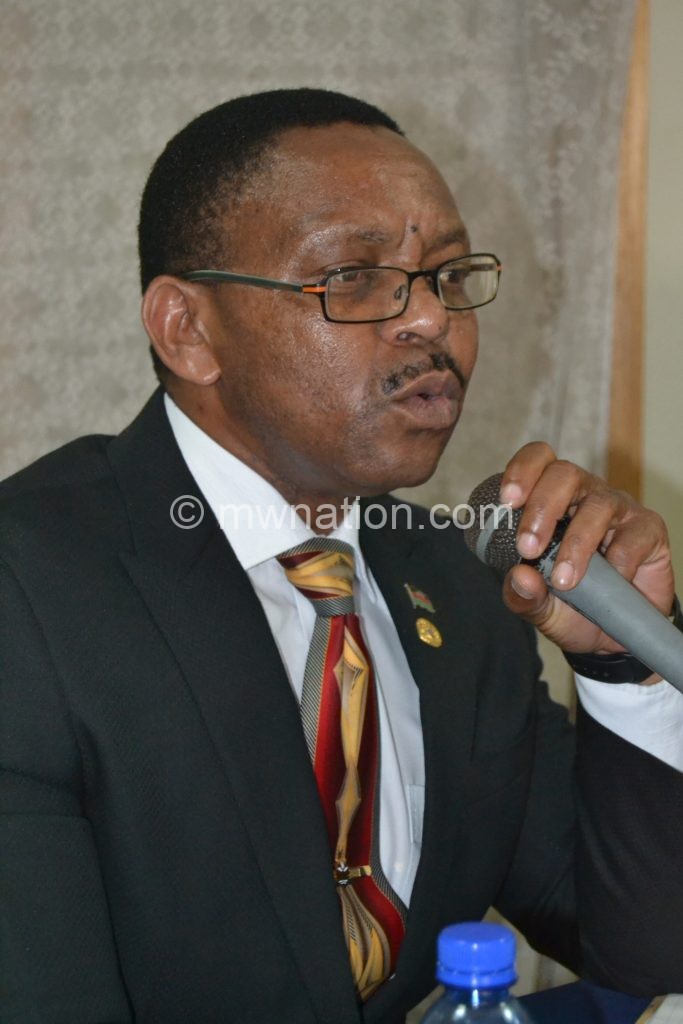‘Cashflow is a problem in water boards’
A comparative analysis of the Auditor General (AG) report on selected accounts of Statutory bodies ending June 2018 shows that water boards are limping, facing weaknesses in financial control, and operations that are affecting provision of water. Our Mzuzu Bureau Supervisor JOSEPH MWALE spoke to Comptroller of Statutory Corporations, STUART LIGOMEKA on the matter.

Where are these problems emanating from?
The water boards are each facing unique challenges although some of those challenges are common to all. For Blantyre Water Board [BWB], I can highlight two as the major challenges: high electricity bills because it pumps water from Walker’s Ferry up a steep gradient to Blantyre city; and aged reticulation which results in frequent pipe bursts and the said high non-revenue water.
Previously, BWB’s third problem was low water yield. However, this problem was addressed at the water intake. However, the increased water yield increased pressure on the old reticulation thereby compounding the NRWB through more pipe bursts. The old reticulation applies to almost all the water boards, hence, the problem of high pressure on NRWB applying to almost all the water boards, though at different levels. The source of the challenge of high electricity costs is that the liberalised energy sector is using an automatic price mechanism whereby the price of electricity automatically increases almost annually while water tariffs do not.
As such, the water boards sell water at the same price for three or more years yet they are producing it using more expensive electricity. This means that the water boards’ profitability would still be going down with time even if we held all other factors constant because the electricity bill has been an ever increasing variable.
How financially stable are these water boards, knowing that government is a major debtor on water bills?
For all water boards, and especially for regional water boards, the major cause of their problems has been constrained cashflows due to high levels of debtors, especially public debtors. There have been so many public institutions which have not been making good of their utility bills for sometime and yet their very operations depend on these utilities.
For example, there are so many public hospitals that have unsettled water bills with the waterboards yet if the water board were to disconnect the hospital, it would appear inhumane and there will be a public outcry. As a result, we have water boards that are making profits on paper which do not translate into cash at the bank. You may be aware that for some regional water boards, the public institutions constitute over 50 percent of the customer base. Now, one needs to ask themselves a question as to how water boards can remain financially viable if 50 percent of the customer base is not paying over and above private debtors.
What steps have you taken to improve performance levels in the utility firms?
There are so many efforts that are being made by Government on the one hand and the respective institutions on the other. The first one is installation of pre-paid water metres in all public institutions to do away with the problem of unpaid water bills.
Secondly, regarding the electricity tariffs, my department believes that the increases in water tariffs is not the best solution as it simply transfers the burden onto the consumers. Instead, we have tasked the water boards to be efficient and to invest in cheaper water sources. Thirdly, we are also tasking them to invest in alternative sources of energy.
Regarding the remittance of statutory commitments, like pension, and taxes, the key is the cashflow. The foregoing efforts aimed at resolving the cashflow challenges are aimed at resolving this challenge because it is only when the water board is financially liquid that they can start making timely remittances.
What role does board of directors have in ensuring that these challenges are averted or stopped?
The boards of directors are there to provide oversight and strategic direction. Through operational and financial reports, the boards are made aware of these situations and necessary decisions are made including where the board needs to engage the central government. For example, the boards have ever approached government regarding the public debtors and government has ever intervened accordingly. So, the role of the board is critical.
However, there is a limit to which the board can go. The boards still require cooperation from all stakeholders including the general public. Similarly, controlling officers of private and public institutions as well as the general public have a responsibility to assist the boards by paying their bills on time and in full.
Looking ahead, what role will you take to ensure efficiency in the water boards?
We came across the Audit Report some time back and some of the “moving forward” issues have already been undertaken as you can appreciate from the above. For purposes of clarity, I can give further examples that we came up with a comprehensive summary of the public debtors’ position for government’s consideration to intervene to rescue the water boards. We also assisted in lobbying to ensure that the water boards are allowed to install pre-paid water metres in the public institutions, including Capital Hill.
We have also supported the boards of directors in coming up with Performance Management Systems [PMS] which they can use in ensuring that the respective challenges are translated into targets for respective members of Executive Managements of the institutions. The expectation is that once the tools are implemented, rewards and sanctions will motivate employees to perform at their level best.





